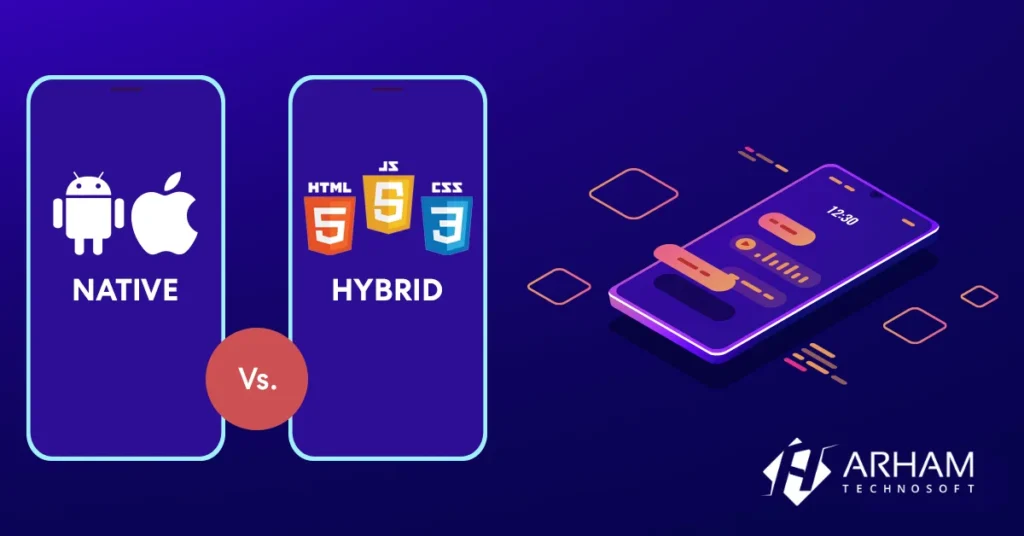Table of Content
- Introduction
- Definition of Native Apps
- Definition of Hybrid Apps
- Importance of Mobile App Development
- Native Apps
- 2.1. Overview
- 2.2. Advantages
- Performance and Speed
-
- User Experience
-
- Access to Device Features
- 2.3. Disadvantages
- Development Time and Cost
-
- Platform-specific Codebase
- Hybrid Apps
- 3.1. Overview
- 3.2. Advantages
- Cross-platform Compatibility
-
- Faster Development Cycle
-
- Cost-effectiveness
- 3.3. Disadvantages
- Performance Limitations
-
- Limited Access to Native Features
-
- UI/UX Challenges
- Factors Influencing the Choice
- 4.1. Project Requirements
- 4.2. Time and Budget Constraints
- 4.3. Target Audience and User Experience
- 4.4. App Complexity and Features
- When to Choose Native Apps?
- 5.1. High-Performance Requirements
- 5.2. Superior User Experience
- 5.3. Full Access to Device Features
- 5.4. Platform-specific UI/UX
- When to Choose Hybrid Apps?
- 6.1. Cross-platform Development
- 6.2. Rapid Prototyping and MVPs
- 6.3. Limited Budget
- 6.4. Simple Apps with Basic Features
- Conclusion
- Recap of Differences
- Final Consideration for Choosing the Right Approach
- Importance of App Maintenance and Updates
Here’s a bit of a cheat sheet on both Native and Hybrid apps, so you get a side-by-side comparison:

Introduction:
In today’s digital landscape, mobile applications have become an indispensable part of modern businesses, enabling them to reach and engage with a broader audience. When developing a mobile app, businesses face a crucial decision: whether to opt for a native app or a hybrid app. Each approach has its advantages and disadvantages, and understanding the differences between them is essential for making the right choice. This article aims to provide a comprehensive comparison between native apps and hybrid apps to help businesses and developers decide which option aligns best with their specific needs and goals.
Native Apps:
Overview:
Native apps are developed specifically for a particular mobile operating system (e.g., iOS for Apple devices or Android for Android devices) using the platform’s native programming languages and tools (e.g., Swift or Objective-C for iOS, Java or Kotlin for Android). As a result, these apps can take full advantage of the device’s capabilities and deliver optimal performance and user experience.
Advantages of Native Apps:
- Performance and Speed: Native apps are known for their superior performance and speed compared to other app types. They can utilize the full potential of the device’s hardware, resulting in smoother animations, quicker response times, and overall better user experiences.
- User Experience: Native apps offer a more seamless and intuitive user experience, as they are designed to adhere to the platform’s guidelines and conventions. This ensures that the app feels familiar and consistent with other native apps on the user’s device.
- Access to Device Features: Native apps have unrestricted access to the device’s features, such as camera, GPS, accelerometer, and more. This enables developers to create feature-rich apps with advanced functionalities.
Disadvantages of Native Apps:
- Development Time and Cost: Developing native apps requires separate codebases for each platform, which can increase development time and cost significantly, especially for complex apps or those targeting multiple platforms.
- Platform-specific Codebase: Since native apps are built using platform-specific programming languages, developers need expertise in different technologies for each platform, leading to potential resource and skillset challenges.
Hybrid Apps:
Overview:
Hybrid apps, on the other hand, are developed using web technologies like HTML, CSS, and JavaScript and then wrapped in a native container to run on multiple platforms. This approach allows developers to write code once and deploy it across various platforms, making it more cost-effective and time-efficient.
Advantages of Hybrid Apps:
- Cross-platform Compatibility: Hybrid apps offer a significant advantage in terms of cross-platform compatibility. By using frameworks like React Native or Ionic, developers can write code once and deploy it on both iOS and Android platforms.
- Faster Development Cycle: As hybrid apps share a single codebase, the development cycle is faster, reducing time-to-market and enabling rapid prototyping.
- Cost-effectiveness: Since hybrid apps require a single codebase for multiple platforms, they are more cost-effective than developing separate native apps for each platform.
Disadvantages of Hybrid Apps:
- Performance Limitations: Hybrid apps may not perform as well as native apps, especially for resource-intensive tasks, due to the additional layer of the WebView used to display web content.
- Limited Access to Native Features: Although hybrid apps can access some device features through plugins, they might not have the same level of access as native apps, potentially limiting the scope of app functionalities.
- UI/UX Challenges: Achieving a consistent and native-like user experience across platforms can be challenging with hybrid apps, as differences in UI elements and navigation patterns may occur.
Factors Influencing the Choice:
Before deciding between native and hybrid app development, several factors should be considered to ensure the chosen approach aligns with the project’s requirements and goals.
Related: Top trends for mobile app development
Project Requirements:
Understanding the specific requirements of the app is crucial. If the app needs to access advanced device features or demand high performance, native app development might be the preferred choice. On the other hand, if the app is relatively simple and requires faster development, a hybrid approach could be more suitable.
Time and Budget Constraints:
Projects with tight timelines or limited budgets might find hybrid development more appealing due to its ability to save time and costs associated with developing and maintaining separate codebases for each platform.
Target Audience and User Experience:
Consider the target audience and their preferences. Native apps provide a more seamless user experience due to their adherence to platform-specific design guidelines, which might be crucial for engaging users effectively.
App Complexity and Features:
The complexity and range of features required in the app play a vital role in choosing the right approach. Complex apps with advanced functionalities might benefit from native development, while simpler apps can be efficiently developed using hybrid technology.
When to Choose Native Apps?
- High-Performance Requirements: If the app requires demanding computations, real-time interactions, or resource-intensive tasks, native development should be considered to ensure optimal performance.
- Superior User Experience: For apps where user experience is a critical factor, native development is recommended to provide a seamless and consistent experience that aligns with platform-specific design principles.
- Full Access to Device Features: Apps that heavily rely on device features such as GPS, camera, NFC, or augmented reality should opt for native development to leverage these functionalities fully.
- Platform-specific UI/UX: If the app needs to have a platform-specific look and feel, native development is the preferred choice as it allows for greater customization and adherence to each platform’s guidelines.
When to Choose Hybrid Apps?
- Cross-platform Development: For projects aiming to reach a broader audience across multiple platforms without the need for separate codebases, hybrid development offers a cost-effective and time-efficient solution.
- Rapid Prototyping and MVPs: If the primary goal is to launch a Minimum Viable Product (MVP) quickly to test the market, hybrid apps provide a faster development cycle and cost-effective option.
- Limited Budget: Hybrid app development is ideal for projects with constrained budgets, as it enables developers to leverage existing web development skills and codebase for multiple platforms.
- Simple Apps with Basic Features: For apps with straightforward functionalities and minimal reliance on device-specific features, hybrid development can be a suitable choice, especially for content-based apps or informational websites.
Conclusion:
In conclusion, choosing between native and hybrid app development depends on various factors, including project requirements, time constraints, budget, target audience, and app complexity. Native apps excel in performance, user experience, and access to native features, making them ideal for demanding and feature-rich apps. On the other hand, hybrid apps offer cross-platform compatibility, faster development cycles, and cost-effectiveness, making them suitable for simpler apps and projects with budget constraints.
Ultimately, the decision must align with the project’s goals and long-term vision. It’s essential to carefully evaluate the specific needs of the app and consider the advantages and limitations of each approach before making an informed choice. Additionally, regardless of the chosen approach, app maintenance and updates are critical to ensure a seamless user experience and the continued success of the mobile application. Both native and hybrid app development have their strengths, and choosing the right one will lead to a successful and impactful mobile application.
At Arham Technosoft, we take pride in being a top native and hybrid app development company. Our team of skilled professionals is dedicated to creating innovative and high-quality mobile applications that cater to your specific needs. Whether you require a native app for a specific platform or a hybrid app for cross-platform compatibility, we have the expertise to deliver exceptional results.
Are you ready to bring your app idea to life? Partner with us, and let’s turn your vision into reality! Contact us today to discuss your project and take the first step towards creating a successful and impactful mobile app. Your success is our priority, and we look forward to working with you to achieve your goals.
Reach out to us now and unlock the full potential of your app idea with Arham Technosoft, your trusted native and hybrid app development partner. Let’s build something amazing together!
FAQs
The main difference lies in their core architecture. Native apps are developed specifically for a particular platform, such as iOS or Android, using platform-specific programming languages and tools. On the other hand, hybrid apps are developed using web technologies like HTML, CSS, and JavaScript, and then wrapped in a native container to run on multiple platforms.
Native apps generally offer better performance and speed compared to hybrid apps. Native apps run directly on the device’s hardware, allowing them to leverage the full potential of the device, resulting in smoother animations and faster response times.
Yes, developing native apps can be more expensive compared to hybrid apps. Native apps require separate codebases for each platform, which means developers need expertise in different programming languages, leading to higher development costs.
While hybrid apps can access some device features through plugins, they may not have the same level of access as native apps. Native apps have unrestricted access to the device’s hardware features, offering more opportunities for advanced functionalities.
Hybrid apps are better suited for cross-platform development. They allow developers to write code once and deploy it on multiple platforms, making them a cost-effective and time-efficient solution for reaching a broader audience.
Hybrid apps generally have a shorter development cycle compared to native apps. Since they share a single codebase for multiple platforms, developers can save time and reduce time-to-market, making them a popular choice for rapid prototyping.
Yes, native apps offer greater customization options compared to hybrid apps. Since they are developed using platform-specific programming languages, developers have more control over the app’s design and user interface to align with each platform’s guidelines.
For high-performance requirements and resource-intensive tasks, native apps are the preferred choice. They can fully utilize the device’s hardware capabilities, ensuring optimal performance for demanding computations and real-time interactions.
Yes, hybrid apps can work offline just like native apps. By using caching mechanisms and local storage, hybrid apps can store data locally on the device, allowing users to access certain features or content even without an internet connection.
Hybrid app development is more suitable for projects with budget constraints. The ability to use a single codebase for multiple platforms makes hybrid apps more cost-effective compared to developing separate native apps for each platform.

